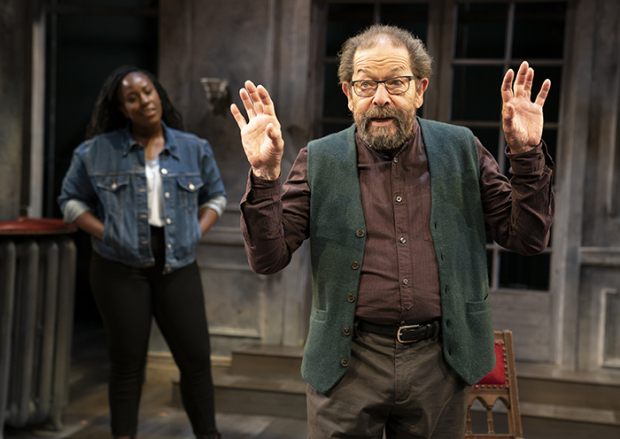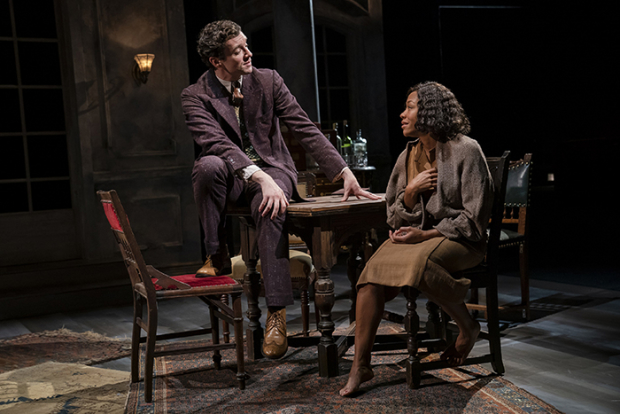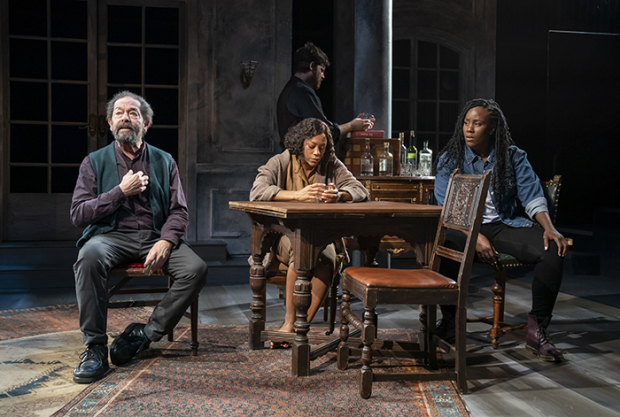Tony Kushner's A Bright Room Called Day Corrects Its Past Mistakes — and Hopes America Will Too
Kushner updates his Reagan-era critique of dangerous right-wing politics for a new production at the Public Theater.

(© Joan Marcus)
Tony Kushner is exorcising some personal demons in his new version of A Bright Room Called Day, a play he debuted in 1985 and has reworked for a production at the Public Theater to encompass the modern-day catastrophes he predicted in his first draft 34 years ago.
In its 20th-century incarnation, the play paralleled the rise of Hitler in Weimar Germany with all-American Reaganism — a patriotic fervor that galvanized the conservative right in a way that threatened civil rights, religious freedom, and the victims of the AIDS epidemic. Now, the play's scope extends to Trump's America — the logical conclusion of what we might look back on as only the first rumblings of trouble in the '80s.
Perhaps Kushner can feel a dash of vindication for his clairvoyance, particularly toward those critics who found the line he drew between Adolf Hitler and Ronald Reagan tenuous at best and offensive at worst. This production flashes between 1930s Berlin and present-day New York where the playwright (manifested by a haimish and Kushner-esque Jonathan Hadary) debates dramaturgical choices with his 35-year-old failed theatrical device named Zillah (Crystal Lucas-Perry playing an omniscient commentator of sorts). However, the retrospective play has less an air of "I told you so" than it does a sense of grasping panic: about the world tumbling toward its past mistakes, about being a playwright who is incapable of fixing his own dramatic errors, about the possibility that theater is just inertia disguised as a crusade.
It's a lot of ideas and anxieties to pack into a single play, even when that play approaches the three-hour mark. But Kushner and his longtime collaborator Oskar Eustis (who saw the play's first mounting off-off-Broadway and directed one of its earliest productions in San Francisco in 1987) have struck an engaging balance that shifts our attentions from the head to the heart to the funny bone, just before fatigue — intellectual, emotional, or physical — can set in.

(© Joan Marcus)
Wearing most at our emotional endurance is the play's central thread, which kicks off at a 1932 Berlin New Year's celebration where some misfit Communists are enjoying a drunken revel in a beautiful Berlin apartment (a bohemian haven designed by David Rockwell). The apartment belongs to the film actor Agnes Eggling (Nikki M. James), who carouses with painter Annabella Gotchling (Linda Emond), homosexual psychologist Gregor "Baz" Bazwald, self-involved and decidedly apolitical actor Paulinka Erdnuss (Grace Gummer), and Trotsky acolyte in exile Husz (Michael Esper), whose romantic relationship with Agnes largely hinges on her craving his revolutionary spirit.
By mid-1932, Nazism is on the rise but Hindenburg is holding on to power (information we're supplied by interstitial slides, designed by Lucy Mackinnon, projected above the stage). Everyone does their part to resist: Baz observes Nazi rallies from the inside (Urie manages to carry mountains of pain inside his flippant wit), Gotchling (an unflappable Emond) makes posters for the Communist party, and Husz (Esper feeling dangerously explosive at most moments) wears the scars of his disobedience under an eye patch.
So what can Agnes do? She can write a play!
It's a project she accomplishes for the Communist party that, for a time, makes her feel like she's moved the needle (Communists win 12 new seats in the Reichstag in November 1932, while the Nazis lose 34). But history shows us these victories don't last long, and Agnes's descent into complete paralysis within the familiar walls of her Berlin apartment — performed by James like a supernova that flares and then collapses in on itself — is a tragic inevitability that is difficult to watch.
The most distraught witness to Agnes's refusal to either fight or flee is Zillah, our observer from the future who has just gotten the news about our 45th president. Until now, she — and theater critics — have been dissatisfied with the passive role her playwright (given the name Xillah for the purposes of this production) has given her to play. So the two (that is, the two sides of Kushner's brain) now hash out their differences in front of us. Zillah (Lucas-Perry embodying the reckless exuberance of a young playwright) thinks she should be allowed to visit the long-dead Agnes to warn her of her fate (rather than just writing hate mail to Ronald Reagan like she did in earlier versions of the play). Xillah (Hadary lending his gentle voice to the mature realist in Kushner) thinks it's silly to pretend we can communicate with the dead.
Don't worry, that doesn't rule out other forms of classic Kushner magic: Estelle Parsons appears several times as a ghostly omen, and Mark Margolis gets to be the maniacal center of a particularly fantastical scene. That seeming double standard of theater magic, however, leads us right into the heart of this new iteration of A Bright Room Called Day — a play that is more commentary on an old play than the play itself.
I'm sure that description just made a lot of eyes glaze over. Understandably, not everyone wants a self-conscious playwright interrupting his own dramatic moments like an intellectual Mystery Science Theater 3000. Zillah and Xillah certainly get into a heady (and wordy) exchange while shadows of the Third Reich hover in the background. But the debate is a worthy one that challenges our very participation in the act of revolution we like to call art. Regular theatergoers are the first to tout the form's high place in moral society. But do the actions of imagined figures actually inspire real-world activism? Or do they merely bolster the fantasies that dangerously bleed into reality? Or worse yet — do they actually do nothing at all?

(© Joan Marcus)







